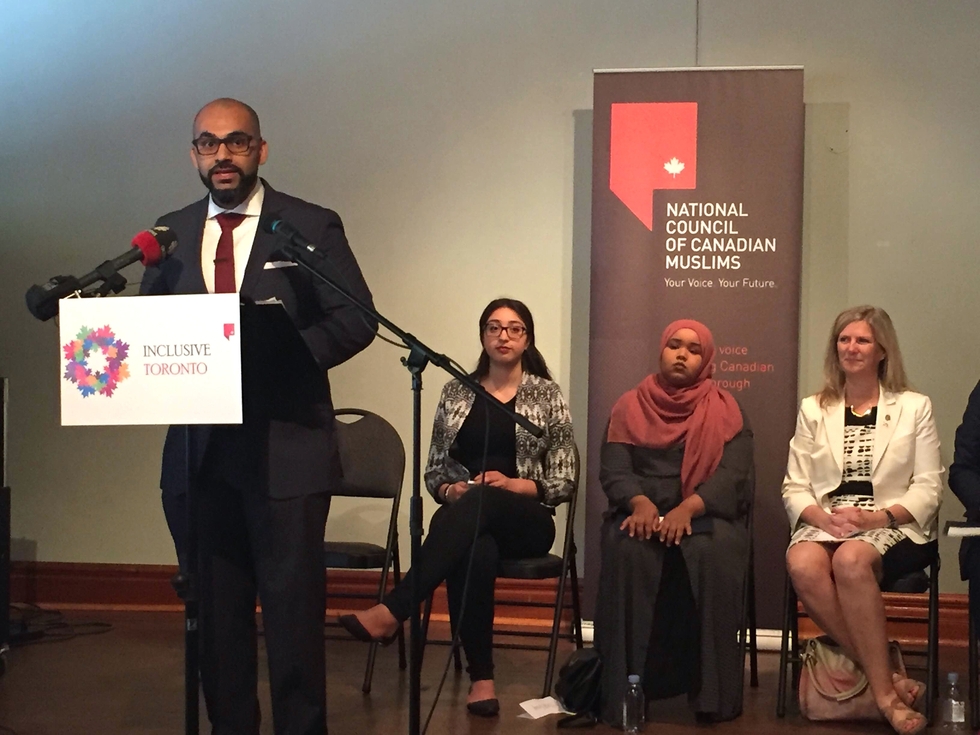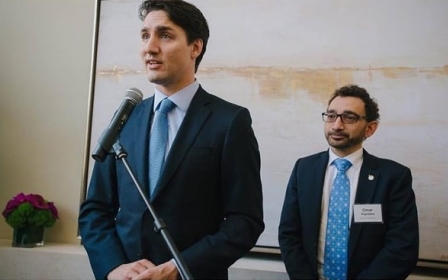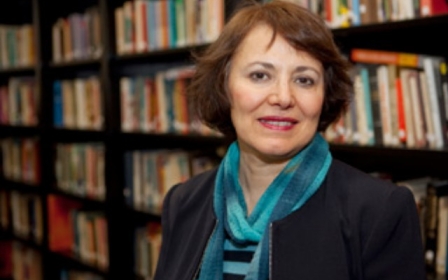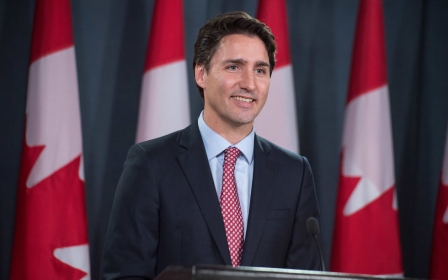Canadian rights groups unveil charter to combat rising Islamophobia

TORONTO, Canada – Community leaders, activists and politicians have gathered across Canada to endorse a charter that condemns Islamophobia amid a reported rise in anti-Muslim bigotry and hate crimes.
The National Council of Canadian Muslims’ (NCCM) Charter for Inclusive Communities asserts that Islamophobia, like all other forms of racism, xenophobia and hatred, “has no place in Canadian society”.
It condemns all acts of hatred and discrimination against anyone, and the exclusion of marginalised communities from fully participating in society. It also calls on the government, civil society groups, public officials and all Canadians to help enact policies that will reduce and eliminate Islamophobia.
“Islamophobia is something that we need to name because it exists. It is something that we must tackle,” said Jagmeet Singh, a member of the Ontario provincial parliament, at a press conference on Monday in Toronto.
The charter was unveiled simultaneously in six cities across Canada on Monday morning.
“I think it’s important that political leaders show leadership in changing the culture … Political leaders are in a great position to not only welcome and embrace, but to celebrate Islam and celebrate the Muslims that make up our country,” Singh said.
Singh, who is Sikh, described being harassed while growing up in Windsor, Ontario, and said he sometimes endured verbal abuse when he was mistaken for being Muslim.
“As a Sikh, my response and the Sikh community’s response is not to say, ‘No, we’re not Muslim.’ The Sikh response and the Canadian response is to say, ‘No, that’s wrong,’” Singh said.
‘Epidemic of Islamophobia’
On Monday, the Toronto Star newspaper reported on a new survey that described “an epidemic of Islamophobia” in Ontario, Canada’s most populous province.
“Only a third of Ontarians have a positive impression of the religion and more than half feel its mainstream doctrines promote violence (an anomaly compared to other religions),” the survey, released by the Ontario Council of Agencies Serving Immigrants (OCASI) and advocacy group Mass Minority, reported, according to the Star.
Several incidents of Islamophobia have been reported in Ontario in recent months.
In June, a Muslim woman was spat on, punched, and had her headscarf pulled while with her infant son at a grocery store in London, Ontario. “I do worry about the safety of all Muslim women who wear hijab,” the 25-year-old woman, who did not want to be identified, told the London Free Press after the incident.
“Before I thought it was just a statistic that I would see happen to people, but now I know it’s real and it happened to me.”
In late May in the same city, an Iranian student, Mohammad Sharifi, was beaten and verbally abused by two men, who allegedly used racial slurs and told him to go back to his country.
Elsewhere in Canada this year, a pig’s head was left outside an Islamic cultural centre in Quebec City with a note reading “Bonne [sic] Appetit,” anti-Muslim graffiti was spray-painted on a Calgary school, and Syrian refugees were pepper-sprayed by a passerby while attending a welcome event in Vancouver.
In March, civil society groups in the western Canadian province of British Columbia launched an Islamophobia hotline to provide free legal advice to anyone subjected to an anti-Muslim incident.
The city of Toronto, meanwhile, recently launched a public awareness campaign against Islamophobia in cooperation with OCASI. “Muslims are part of Toronto” ads have gone up around the city, sparking a public discussion around anti-Muslim bigotry.
Hate crimes targeting Canadian Muslims more than doubled between 2012 and 2014, Statistics Canada data showed. While hate crimes were down overall in Toronto in 2015, local police noted an increase in anti-Muslim incidents.
LGBT-Muslim solidarity
Michael Erickson is the CEO of the Glad Day bookshop, a Toronto bookstore that bills itself as the world’s oldest lesbian, gay, bisexual and transgender (LGBT) bookstore.
“We know what it means to be misunderstood. We know what it means to be misrepresented, and we see those same things happening with our Muslim brothers and sisters,” Erickson said while supporting the charter on Monday.
Erickson stressed the intersectionality of the LGBT community, which also includes people of colour, racialised individuals and members of religious and ethnic minorities. He said outsiders are seeking to make the two communities into enemies, but that together, both will be stronger.
“We will stand united in the solidarity with any group who wants to counter fear with love, [to] counter fear with justice,” Erickson said.
“This is actually a very inclusive statement. It is calling for an end to Islamophobia, to an increasing understanding of our differences, of our beauty. We as gay and lesbian, bi and trans people, the basis to our community is love, and we know the basis of the Muslim community is also love.”
‘Go back home’
Munira Abukar, a Muslim community activist in Toronto, agreed that the charter sends a strong message of inclusion. “It makes us all feel included and loved and valued,” she said.
While running for a seat on the Toronto city council in 2014, one of Abukar’s campaign posters was defaced with the words, “Go back home.” The incident is something that has left her feeling unsettled even until this day, she said on Monday.
“Why am I being told to go back home? I’m a first generation. I was born and raised here,” she said. “When do we really start feeling like everyone here is Canadian? When do we start feeling like everyone here has a place to belong? When do we start working together to build a stronger Canada?”
Abukar said she has witnessed incidents of anti-Muslim verbal and physical violence first-hand in the city, but the charter provides a sense of hope.
“To many it’s a piece of paper. To me, it’s a physical [manifestation] of the fact that there’s hope.”
New MEE newsletter: Jerusalem Dispatch
Sign up to get the latest insights and analysis on Israel-Palestine, alongside Turkey Unpacked and other MEE newsletters
Middle East Eye delivers independent and unrivalled coverage and analysis of the Middle East, North Africa and beyond. To learn more about republishing this content and the associated fees, please fill out this form. More about MEE can be found here.





